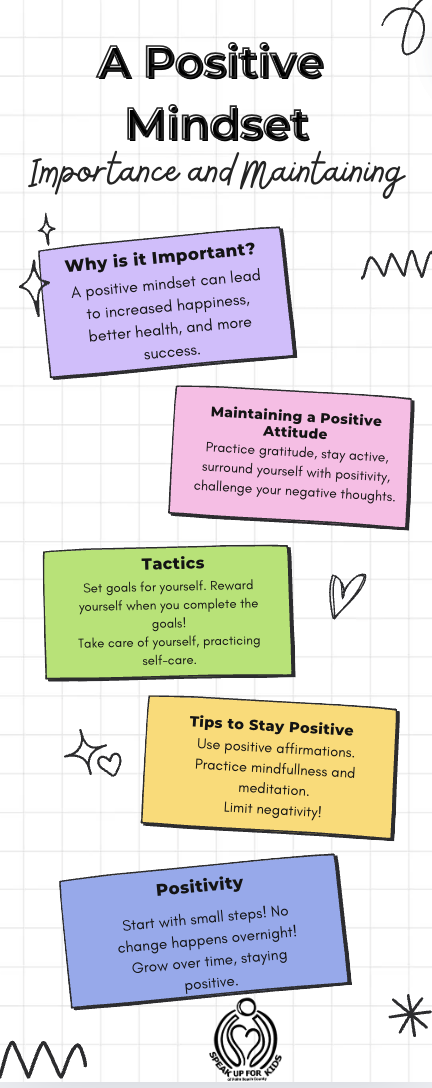Mindset Matters
Contributed by Speak Up for Kids Student Intern Team — This article was developed through the combined efforts of multiple student interns, each bringing unique skills and perspectives to support life skills education for foster youth.
Overview
Your mindset plays a crucial role in determining your success, happiness, and overall well-being. Having a positive and growth-oriented mindset can help you navigate challenges, achieve your goals, and maintain resilience in the face of adversity. Here’s a guide on why mindset matters and how to cultivate a mindset that supports your growth and well-being.
Steps:
Understand the Importance of Mindset:
Growth vs. Fixed Mindset: Learn the difference between a growth mindset (believing abilities can be developed) and a fixed mindset (believing abilities are static).
Impact on Life: Recognize how your mindset affects your actions, decisions, and reactions to setbacks.
Identify Your Current Mindset:
Self-Reflection: Reflect on your thoughts and behaviors. Do you see challenges as opportunities or threats? Do you believe effort leads to improvement?
Journal: Keep a journal to track your thoughts and identify patterns that reflect your mindset.
Challenge Negative Thoughts:
Cognitive Restructuring: Practice challenging and reframing negative thoughts. Replace “I can’t do this” with “I can learn and improve.”
Positive Affirmations: Use positive affirmations to reinforce a growth mindset and boost self-confidence.
Embrace Challenges and Learn from Failures:
View Challenges as Opportunities: See challenges as chances to learn and grow rather than obstacles.
Learn from Mistakes: Reflect on failures to understand what went wrong and how you can improve in the future.
Set Realistic and Achievable Goals:
SMART Goals: Set Specific, Measurable, Achievable, Relevant, and Time-bound goals to maintain focus and motivation.
Break Down Goals: Break larger goals into smaller, manageable steps to make progress more attainable.
Cultivate Resilience and Perseverance:
Stay Persistent: Keep pushing forward despite setbacks. Understand that progress often comes from perseverance.
Build Coping Strategies: Develop healthy coping strategies for stress and setbacks, such as mindfulness, exercise, and seeking support.
Surround Yourself with Positive Influences:
Supportive Community: Surround yourself with people who encourage and support your growth.
Role Models: Look up to role models who exemplify a growth mindset and learn from their experiences.
Key Questions:
What is My Current Mindset?
Do I believe my abilities and intelligence can grow with effort?
How do I typically respond to challenges and setbacks?
How Can I Challenge Negative Thoughts?
What are common negative thoughts I have, and how can I reframe them positively?
What positive affirmations can I use to boost my mindset?
How Do I View Challenges and Failures?
Do I see challenges as opportunities to learn or as threats to avoid?
How can I learn from my past failures and use them to grow?
What Goals Should I Set?
What are my short-term and long-term goals, and are they realistic and achievable?
How can I break down larger goals into smaller steps?
How Can I Cultivate Resilience?
What strategies can I use to stay persistent in the face of setbacks?
How can I develop healthy coping mechanisms for stress and adversity?
Who are My Positive Influences?
Who in my life supports and encourages my growth?
What role models can I look up to for inspiration and guidance?
Tips:
Be Kind to Yourself: Practice self-compassion. Understand that growth takes time and effort.
Stay Curious: Cultivate a sense of curiosity and a love for learning. Embrace new experiences and knowledge.
Celebrate Progress: Acknowledge and celebrate your progress, no matter how small. Recognize your efforts and achievements.
Practice Gratitude: Regularly reflect on and appreciate the positive aspects of your life and the progress you’ve made.
Final Thoughts
By following these steps and considering these questions, you can cultivate a mindset that supports your growth and well-being. Remember, mindset matters, and developing a positive and growth-oriented mindset can significantly impact your life and happiness.


